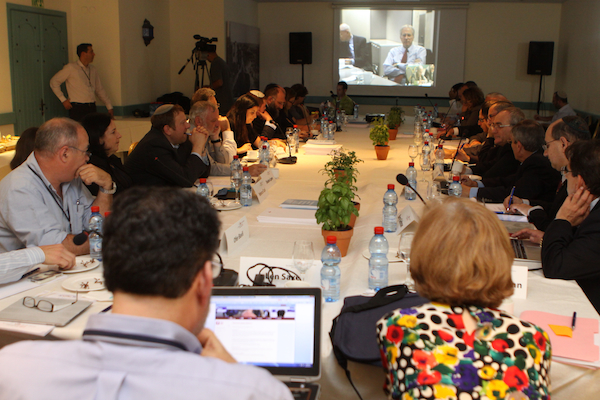Opening Remarks by Avinoam Bar-Yosef (March 11, 2014)
JPPI’s 2014 brainstorming conference was initiated to address the urgent need to discuss in depth a few processes that are coming to a crossroads at the same time, and which will have great long-range impact.
First: Secretary Kerry’s forceful effort to bring an end to the Palestinian-Israeli conflict, which has been going on since the inception of Herzl’s Zionist movement.
Second: The West-Iranian negotiations, which may conclude with a compromise endorsed by the free world and rejected by Israel.
Third: Possible emerging frictions between Israel and the U.S. administration, which may affect relations between the two largest Jewish communities – in Israel and North America.
Last, but certainly not least: The initiative of Israel’s Ministry of Justice to consider legislation on Israel as a Jewish and democratic state at a time when different ideological groups within Israel hold conflicting views of how these components should be prioritized.
Professor Ruth Gavison, who was tasked by Justice Minister Tzipi Livni with elucidating legislation on Israel’s Jewish and democratic identity, understands that such a historic undertaking should not occur without consulting world Jewry. Professor Gavison asked that JPPI utilize its “unique position” as a global Jewish policy institute to assemble and analyze the reflections and attitudes of Jews worldwide.
The 2014 Glen Cove brainstorming conference is the culmination of a series of JPPI seminars on Israel’s character held in Jewish communities around the world. It brings together academics, leaders, and professionals to help integrate our findings and incorporate them into the broader geopolitical picture.
This small collection of background papers was prepared by JPPI senior fellows in anticipation of the conference. It opens with Ambassador Avi Gil’s (with the assistance of Brig. Gen. (res.) Michael Herzog) sharp and comprehensive analysis of the geopolitical challenges currently faced by Israel. It is followed by Shmuel Rosner’s exceptional paper, which lays out the central questions discussed in the JPPI seminars. The book closes with Dr. Shlomo Fischer’s consideration of last October’s Pew report, A Portrait of Jewish Americans, which has generated voluminous and widely varying responses within the Jewish world. All three contemplate the triangular relationship between Washington, Jerusalem, and the American Jewish community – and how it may be changing. They will surely provoke, inform, and shape the Glen Cove discussions.
In this context, there are a couple of thoughts I would like to share. Perceptions in the international arena, and especially in the Middle East, that the United States is declining as a super power, place a weighty burden on Israeli decision makers. “e trust Israelis have in U.S. support is critical to their coping with diffcult choices and accepting painful compromises attendant in every aspect of the unfolding regional developments.
In regard to Israel’s demand for Palestinian recognition of a Jewish state: Israelis believe that it is their prerogative to define their country as the nation-state of the Jewish people. But at the same time, they feel that the Palestinians and the larger Arab world need to make such a recognition for their own sake. Without digesting this fact it would be di#cult for them to embrace an end to the conflict and incitement, and to educate their next generations to accept Jewish sovereignty in the Middle East. Many Israelis worry that the Palestinian goal is to create both a Palestine and a bi-national Israel inside the green line.
Before the Oslo Accords the Israeli leadership refused to recognize the Palestinians as a people with the right to their own state. One of the main achievements of Oslo was that Israelis began to digest the fact that the Palestinians are a people and a nation. “is realization paved the road for a majority of Israelis to recognize the need for reconciliation and peace based on a two-state solution.
“The tension between Jerusalem and Washington arising from different approaches toward Iran’s nuclearization and its existential implications for Israel on one hand, and differences between the two administrations on the compromises necessary to promote a durable peace agreement on the other, may strain bonds between the two Jewish communities.
An atmosphere in which Jews in Israel and Jews worldwide feel connected is also related to the Jewish and democratic character of the State of Israel. Creating an environment of mutual responsibility of Jews for one another is critical to a thriving Jewish future and civilizational continuity. This is what the work at the Glen Cove conference is really about, and it is the raison d’etre for the work of JPPI.
I would like to acknowledge and express my sincerest gratitude for the engagement and dedication of JPPI’s leadership, especially Ambassador Stuart Eizenstat, Ambassador Dennis Ross, and Leonid Nevzlin. “Their wisdom and energies are at the foundation of the labor before us. I would also like to welcome and thank Professor Gavison for her trust in engaging us in this important enterprise.
For a PDF version: Jewish, Democratic, and Recognized

